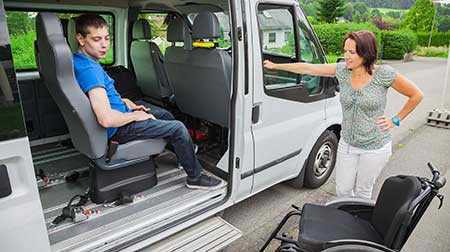Passenger Transport
Helping Local Authorities improve the cost and effectiveness of their passenger transport services.
What do we mean by?
Home to School Transport
- Special Educational Needs – transport arranged for passengers with moderate to high needs usually in receipt of an Education, Health & Care Plan, usually in taxis, minibuses and wheelchair accessible vehicles
- Mainstream – transport arranged for school attenders of all ages usually in small buses, large buses and on the public transport network
Social Care Transport
- Looked After Children – transport other than for education purposes provided for children who are fostered or looked after by the Council which may be for contact visitation or other purposes
- Respite – transport for children usually with special needs to and from respite centres and usually overnight or at weekends
- Adult clients – transport for adult social care clients either with a disability or because of their age usually to day centres, activity centres or community activities
Community Transport
- Transport provided by community transport organisations or by the Council usually on a ‘not for profit’ or social enterprise basis and sometimes underpinned by Council grants
- Transport provided may be for a number of purposes but will usually be for cases of social, physical or geographical isolation but also increasingly underpinned by commercial activity
Commercial bus network
- Transport provided via the local bus network
- Primarily this will be where some form of subsidisation is given by the Council for services provided which otherwise would not be profitable for the bus company to run
Staff Travel
- Travel undertaken by Council staff in their own vehicles for which a mileage rate and / or an essential user rate is offered
- Travel undertaken in pool or hire vehicles whilst on Council business
What do we do?
Review the Travel Offer
- Review the home to school and social care transport offers, eligibility policies and decision making protocols
- Review bus subsidy policy including strategic fit with Council priorities, does the policy support provision of transport at the times and places and at the cost that the Council requires?
- Review staff travel policy
Manage Demand
- Determine whether the existing eligibility policies are being adhered to and understand the expectation of users, parents and schools
- Determine whether decision makers in the process understand eligibility criteria and the costs involved in agreeing eligibility
- Determine whether the process of eligibility review and appeal are managed effectively
Innovative delivery of travel support
- Opportunity to deliver travel support rather than door to door transport
- Determine opportunities to develop travel training for walking, bus or train travel, cycle schemes and walking buses and where economically viable personal transport budgets before consideration of more expensive forms of transport
- For staff travel ensure that pool or hire cars are available for journeys where it makes economic sense to use them
Improve routing and logistics
Where the Council provides transport:
- Undertake a fundamental review of the logistical effectiveness of routes taking account of the special nature of the passengers
- Consult, communicate and implement new routing arrangements
Manage costs of supply
- Where the initial review identifies that costs per passenger are too high, move to a new and innovative procurement approach, strategically igniting and developing the supply base and ensuring the most effective competition and therefore value for money
Integrate organisation and improve accountability
- Bringing together transport delivery functions in to a coherent integrated transport unit with full overview of all internal and external resources and all transport requirements across times of the day and days of the week
- Understand the extent to which any internal resources can assist in getting better value for money from bus subsidy budget
- Encourage community transport to become more commercial instead of relying on grant monies
- Manage pool cars and pool car booking, understanding demand profile and potential for use across the rest of the transport operation
- Introduce IT systems that underpin delivery
Deliver solutions sustainably
- Work alongside your team(s), coaching, mentoring and demonstrating by experience to develop staff effectively
- Recognise and develop particularly talented individuals
- Ensure processes are documented and understood
- Develop effective communications and manage expectations of users
- Introduce a culture of performance and cost consciousness
- Underpin with adequate and regular training programmes



